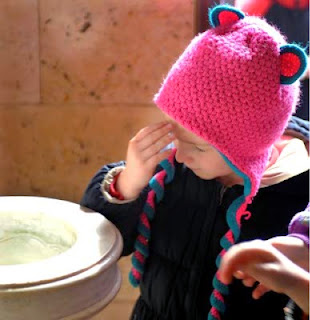Oct. 19, 2014: 29th Sunday in Ordinary A
Click to hear audio homily
Earlier this week, some very young parishioners visited Ascension Church for a tour of the church. They were so young that they could not reach the holy water bowls at the entrance. One of our parishioners had to take the bowl out and lower it so that our 5-year old kindergarten class could dip their fingers in the bowl to make a sign of the cross. One of students thought he was going to get very wet, so he rolled up his sleeve to put his finger in the bowl. When all were seated in the pew near the altar, I fielded random questions from them. Most of the questions were easy to answer. For example, “Fr. Paul, why do you wear that white thing on your neck?” The child was referring to my white collar. Then the same boy who rolled up his sleeve to dip his finger in the holy water bowl asked this question, “Who made God?” I hope he asked that same question to his parents when he went home. How would you have answered him?
As we ponder that question, a good place to start
is with what God said in the First Reading through the Prophet Isaiah. “I am
the LORD and there is no other, there is no God besides me.” The Responsorial
Psalm then explains what we must do since there is no other god than Our Lord.
“Give the Lord glory and honor. Worship the LORD, in holy attire; tremble
before him, all the earth; say among the nations: The LORD is king, he governs
the peoples with equity.”
We give something to God that we do not give to
any earthly ruler -- that is our worship. We are gathered here today, and for
each mass we attend, to worship God, Creator of the universe and Lord of all.
We Christians are in the world but are not of the world. We belong to God, and
our home is heaven. What about our lives outside of the church? Do we live with
this conviction in our daily lives? Sadly, in practice we don’t always put God
first. Sometimes we put the world first and God second. So how are we to live
out our dual citizenship in our daily lives?
The religious leaders in today’s Gospel wanted to
trap Jesus with that very question. They ask Jesus, "Is it lawful to pay
taxes to Caesar or not?" If Jesus says yes, they'll call him a Roman
collaborator. If he says no, the Romans will see him as a rebel and a
troublemaker. So Jesus asks for a coin stamped with the image of the Emperor
Tiberius. Jesus then says “Render therefore to Caesar the things that are
Caesar's, and to God the things that are God's."
Through that statement, Jesus does three crucial
things. First, he acknowledges that Caesar does have rights; that a difference
does exist between the concerns of God and the concerns of Caesar. Second,
Jesus demotes Caesar by suggesting that Caesar has no rights over those things
that belong to God. Only God is God, which means that Caesar is not God. And
third, Jesus remains silent about what exactly belongs to either God or Caesar
--figuring that out belongs to us.
Can our society survive without civil structure
or without citizens who pay taxes and participate in our other duties as
citizens? There was a little rural community in US that made the news when it
won independence after seceding from the nearby township and its taxes. The
small community’s celebration was short lived, though; a few days later, the
residents noticed that their garbage was not picked up. The trash trucks
belonged to the township and because the tiny community broke away from the
township, they no longer had the benefits of the township.
Jesus says we can’t have it both ways–if we
benefit from secular society, we need to support the infrastructure of society.
This can take the form of taxes, military service, jury duty, and informed,
conscientious voting. On the other hand, Jesus says that we need to give to God
what is God’s. But there are also times when political rulers overstep their
authority. Sometimes they attack human dignity, violating natural law that
demands that innocent human life be respected and that liberty be protected.
These are times when Christians have a duty boldly to insist that while Caesar
is owed his due, we won’t stand by and silently watch him step on God’s toes.
St. Paul offers us this advice in the Second
Reading, “For our gospel did not come to you in word alone, but also in power
and in the Holy Spirit and with much conviction.” We are here for a reason: to
change the world, for the sake of the world, in the name of Jesus Christ. The
work belongs to us. Nobody will do it for us. We have to accomplish it by
engaging the laws, the structures, the public policies, the habits of mind, and
the root causes that sustain injustice in our country. We need to act in this
world in a manner that's true to who we are as Catholics, with lives of
Christian service to the poor and afflicted – including the unborn child, the
immigrant, the homeless and the elderly. The more authentically Catholic we are
in our lives, our choices, our actions and our convictions, then the more truly
we will contribute to the moral and political life of our nation.


